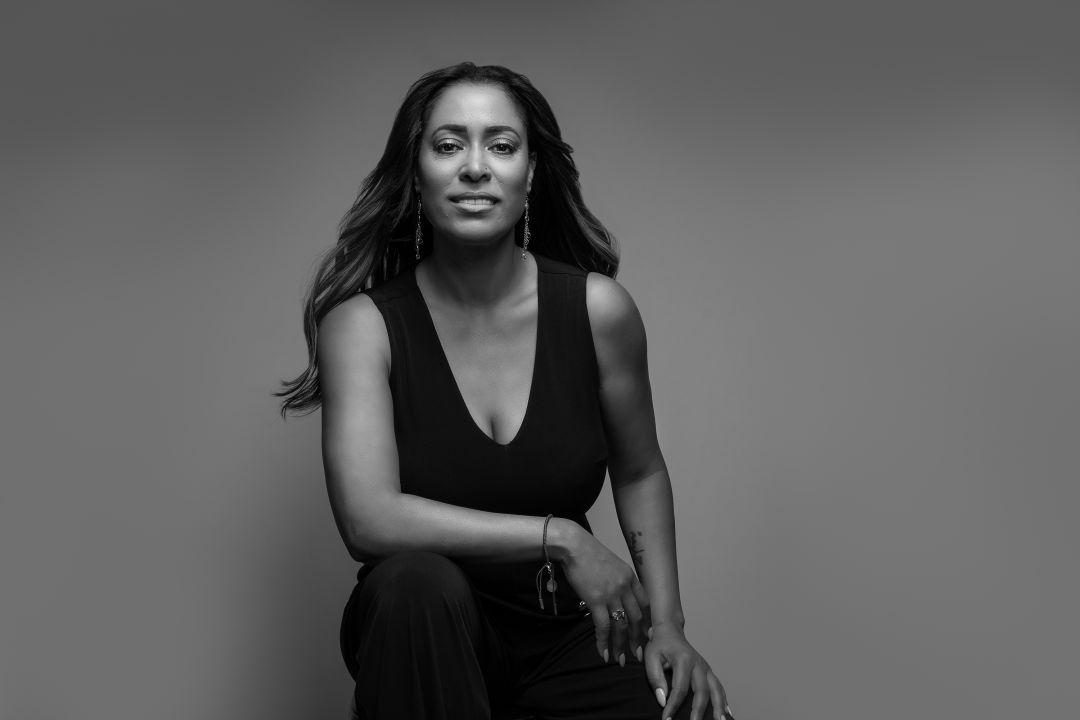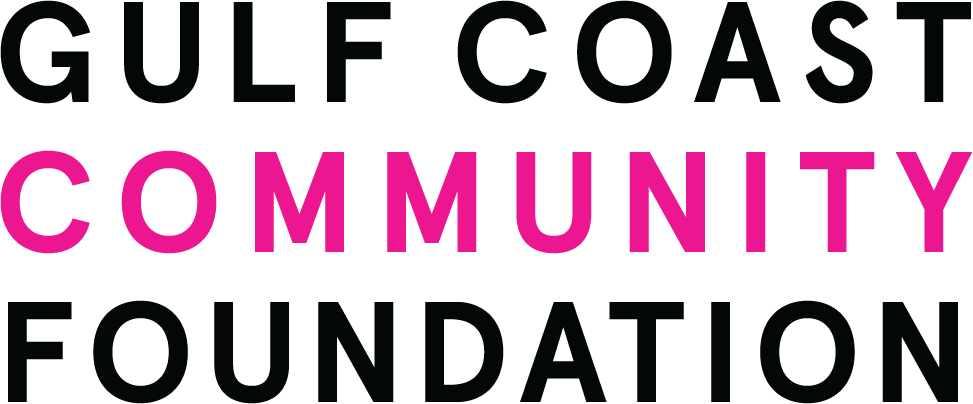Open Arms Consultants' Souad Dreyfus on the Power and Intimacy of Surrogacy and Egg Donation
This article is part of the series Listening to Diverse Voices, proudly presented by Gulf Coast Community Foundation.

Souad Dreyfus
Image: Michael Kinsey
Dreams aren’t often served up in a cafeteria. But for Souad Dreyfus, that was exactly where she encountered a stepping stone to helping people have a biological baby—something she's since made her life's work as founder and CEO of Open Arms Surrogacy and Egg Donation.
Dreyfus had two jobs at the time, one of them at an Italian cafe at Sarasota Memorial Hospital. The way she handled a phone call order caught the attention of a fertility specialist there for a slice of pizza.
“He said he liked the way I spoke with the customer,” she recalls. “I said, ‘Wow, the bar is low for you' and he liked that I had a sense of humor, too."
Dreyfus thought the man might be flirting. But then he invited her to meet his wife at his fertility clinic, and “we hit it off,” she says. At the time, she didn't know what surrogacy was and couldn't spell infertility off-hand yet. But she wound up becoming the receptionist at the fertility specialist's clinic, gradually taking on more responsibility at the practice. “It opened a world and felt like it was my calling,” she says.
With that experience in hand, in 2003, Dreyfus ventured out on her own and founded Open Arms, an egg donation and surrogacy agency, to offer prospective parents, egg donors and surrogates the often-complex services they need in a nurturing, warm environment. Twenty years later, Dreyfus says, her career "still keeps giving me joy and fulfillment."
Tell us a little about where you grew up in Morocco.
"I’m from Agadir, Morocco, and am one of four kids. We're a Muslim family and spoke French and Arabic. My mom stayed home and my dad worked. It was strict, and men’s roles were more important than women's.
"I felt I was different from the beginning. I was the first to go to college and leave the country. At 23, I still needed [my father's] permission to leave. I had a 6 p.m. curfew and I wasn't allowed to have a boyfriend or go clubbing or dancing. But I'm lucky my dad understood that I needed more. I wanted to take care of myself. School was my refuge, where I unleashed my imagination and saw beyond culture and religion. I was in my third year of college when I got my visa. Without speaking English and with little money, I left Morocco in 1998."
What was it like in the States?
"I thought, 'I can stay up late, have sex, and go clubbing!' But nerd that I am, I got two jobs and focused on learning the language instead. I had to start all over. I had to get a GED, too. I went to Keiser College where I got a degree in computer networking and business management because I thought computers were important. But my heart wasn't in it. I couldn't bear to hear anything more about the motherboard!"
What is it like being Moroccan in Sarasota?
"Initially, I lived in Erie, Pennsylvania from 1998 to 1999. I was the only biracial person there. Things have changed since then, but I was very conscious of my race both there and here in Sarasota. Then it shifted. People can't place my accent and when I say I'm Moroccan, they tell me how exotic that is. So now I'm exotic.
"I had to shift from the negative spin and take it as an opportunity to share my heritage. People would think I said I was from Monaco, and ask me about the princess. People don't know where Morocco is, so I tell them it’s in North Africa—and I was the one who had to go back to high school when I got here!
"But it made me feel proud and embrace my identity. I could have shrunken back, but I didn't leave my friends, family and memories so I could do that. If I fall into thinking that people are looking down on me for being an immigrant, that will only steal my power."
What made you start your own agency?
"Not everyone is able to have a baby, and there's so much shame around that. On top of it, people don’t talk about it. When I first started, clients came in and it was sad and secretive. If someone hears they need an egg donor, it [can be] crushing to their spirit. When I took on new responsibilities and assisted with procedures, I felt a profound bond with the prospective parent. They come in with so much hope.
"I wanted to give them a safe space that said, 'It will be OK.' I outgrew the clinical setting and wanted to give a more personal level of care. I couldn't take this journey under someone else's guidelines. That was how Open Arms was conceived."
What do people misunderstand about surrogacy and egg donation?
"The biggest thing is the assumption it’s driven solely by financials. But in reality, I see that clients are motivated by a genuine desire to help others. The money is important, but it’s not the driver. The other thing is that they think only famous rich people have access to this type of service."
"It's not just Nicole Kidman and Ricky Martin. I’ve worked with a handful of famous people, like Argentinian Broadway actor Flavio Mendoza and journalist and author Marisa Brel, but everyday people are trying to do this, too. They have to figure out their resources to accomplish having a baby. People think we’re designing babies, but it’s not about wanting a blue-eyed blond. People just want a child that makes them feel like a mom or dad. We get single parents, same-sex parents, and heterosexual parents. It’s all over the board."
Is the demand for fertility services growing?
"I think the pandemic restricted people and we're catching up. Everything we do centers around medicine and travel, so we dealt with travel bans and other logistics, like vaccination. For example, matching potential surrogates with prospective parents became even more challenging when clients wanted vaccinated surrogates and surrogate moms didn't want to be vaccinated."
Have you ever been a surrogate or used any of the services you offer your clients?
"No. But doing this made me more aware of my fertility. After I married, I had my daughter at 30 and my son at 32. At 38, I went through early menopause and the idea of wanting but not being able to conceive helped me empathize.
"I still don't know what it's like to have that heartbreak of being unable to conceive or needing interventions. But even though I had two kids, not being able to [have more] allowed me to understand my clients more and feel good about helping others make it happen."
What are some things to consider surrounding egg donation?
"Some moms don’t want the fact they need an egg donor to be public. When you use an egg donor, you want to align them with you somewhat. The physical resemblance [between parent, donor and child] can be very important to some—unless you’re a same-sex male couple. They tend to care less about who the baby looks like."
"Although many women would like their egg donor to look like them, I educate them to not get fixated, because genetic outcomes can go so many ways."
"Also, when I started Open Arms, egg donation was often a secret. Now you can do at-home genetic testing and learn you’re not biologically linked to your parent. So I advise clients to tell their child [about how they were conceived] and talk to a psychologist about how to handle these emotions. If the child finds out on their own, you have to restore that trust and they may doubt everything you've ever told them."
What are the biggest challenges you face in your business?
"The legalities. Surrogates don't always come from Florida. I have to make sure we're following all the guidelines while the process is always changing."
"The matching process between donors and surrogates and parents takes into account personal values. Is the surrogate pro-life? If there’s an issue [with the pregnancy], you have to weigh that. Does she want contact after the birth? The restrictive local and national abortion laws are also honing in on our industry, and if we have an abnormality during pregnancy, they can make it hard. We do a lot of screening, which minimizes the chances. But there can be the fear of 'what if?'"
"We have to make sure surrogates and clients are like-minded. It can be intense, so we make ourselves available to them and provide emotional support. When someone loses a pregnancy I have to go and help pick up the pieces, and tell them, ‘We can do this.’ You turn into a friend or a punching bag depending on how things go."
What’s your favorite part of what you do?
"When clients have that baby and send me pictures, I love that. I have Christmas pictures from families that say 'I’ve known you since you were an embryo.' I love the birth announcements, too. One woman had twins and now she sends me hand-written letters to tell me everything going on with them. Things like that bring me a sense of purpose."
Why don’t your clients choose to adopt?
"It’s not easy. While it's another beautiful path to parenthood, some clients come to me after trying to adopt due to the length of time it can take. There are limitations. You have to be heterosexual, in your 30s, and financially stable. Same-sex couples are considered good enough to foster but are discriminated against if they wish to adopt. There are lots of ups and downs. Plus, it’s very expensive. There are plenty of children in the system, but getting one out is hard."
What does your family think of what you’ve accomplished?
"Don't ask, don't tell. I have a sister who doesn't think it's appropriate for our culture. My mom is very supportive, but my family doesn't ask for details. I set boundaries they don't cross, which is unusual because they don't believe in boundaries where I grew up. I'm not interested in their opinion or whether they approve of what I do. But 20 years later, it's more maybe the same-sex piece of it that they don't agree with."
What do you wish more people knew about the industry?
"I wish some people were less judgmental of who decides to do this and would respect everyone's journey to parenthood. It’s not easy to have a family, and certainly not this way. It’s emotionally and financially exhausting. Don't add to it."
"Using a surrogate isn’t about not wanting stretch marks. Ethically, we cannot just accept everyone who wants a surrogate. You have to have a health or psychological reason. I've had clients who were born without a uterus, who’ve had a hysterectomy due to cancer or who are a little bit older. You don’t qualify just because you have the money to pay and want it."
Open Arms Surrogacy and Egg Donation is located at 6497 Parkland Drive, Suite B,
in Sarasota.




